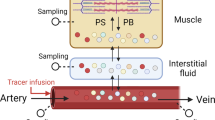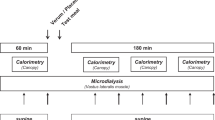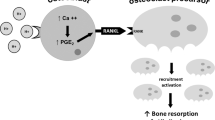Abstract
THE concept and origin of labile body protein that can be reversibly depleted and repleted have already been reviewed in detail1,2. The feeding of a protein-free diet which is adequate in calories results in a rapid decline in the rate of excretion of urinary nitrogen until a low and relatively steady rate is obtained. This level is regarded as the obligatory or endogenous loss of urinary nitrogen and the additional nitrogen above this level, lost during the first few days on a protein-free diet, has been considered to represent the loss of labile body protein. Although it has been suggested that the nitrogen store is present as non-protein nitrogen3,4, the best evidence indicates that it is probably cytoplasmic in origin, with enzymes contributing to the labile protein pool5,6.
This is a preview of subscription content, access via your institution
Access options
Subscribe to this journal
Receive 51 print issues and online access
$199.00 per year
only $3.90 per issue
Buy this article
- Purchase on Springer Link
- Instant access to full article PDF
Prices may be subject to local taxes which are calculated during checkout
Similar content being viewed by others
References
Munro, H. N., in Mammalian Protein Metabolism (edit. by Munro, H. N., and Allison, J. B.), 1, chap. 10 (Academic Press, Inc., New York, 1964).
Fisher, H., in Newer Methods of Nutritional Biochemistry (edit. by Albanese, A. A.), 3, chap. 2 (Academic Press, Inc., New York, 1967).
Wessels, J. P. H., and Fisher, H., Brit. J. Nutrit., 19, 57 (1965).
Fisher, H., Brush, M. K., Griminger, P., and Sotsman, E. R., Amer. J. Clin. Nutrit., 20, 927 (1967).
Allison, J. B., Amer. J. Clin. Nutrit., 4, 662 (1956).
Patwardhan, V. N., Fed. Proc., 20, 73 (1961).
Campbell, R. M., and Kosterlitz, H. W., Biochem. J., 43, 416 (1948).
Allison, J. B., and Wannemacher, R. W., Amer. J. Clin. Nutrit., 16, 445 (1965).
Voit, C. (1866), cited by Munro in Mammalian Protein Metabolism, (edit. by Munro, H. N., and Allison, J. B.), 1, 383 (Academic Press, Inc., New York, 1964).
Gopalan, C., and Narasinga Rao, B. S., J. Nutrit., 90, 213 (1966).
Young, V. R., and Scrimshaw, N. S., Brit. J. Nutrit., 22, 9 (1968).
Evans, R. D., Radium and Mesothorium Poisoning and Dosimetry and Instrumentation Techniques in Applied Radioactivity, Section C, Annual Progress Report, Contract AT (30–1)–952 (US Atomic Energy Commission, Division of Biology and Medicine, May, 1966).
Bricker, M. L., and Smith, J. N., J. Nutrit., 44, 553 (1951).
Duel, H. J., Sandiford, I., Sandiford, K., and Boothby, W. M., J. Biol. Chem., 76, 391 (1928).
Basak, M., Indian J. Med. Res., 43, 307 (1958).
Author information
Authors and Affiliations
Rights and permissions
About this article
Cite this article
YOUNG, V., HUSSEIN, M. & SCRIMSHAW, N. Estimate of Loss of Labile Body Nitrogen during Acute Protein Deprivation in Young Adults. Nature 218, 568–569 (1968). https://doi.org/10.1038/218568a0
Received:
Published:
Issue Date:
DOI: https://doi.org/10.1038/218568a0
This article is cited by
-
Positive Nitrogen Balance in Hypercatabolic States: Results Obtained with Parenteral Feeding after Major Surgical Procedures
European Journal of Intensive Care Medicine (1975)
Comments
By submitting a comment you agree to abide by our Terms and Community Guidelines. If you find something abusive or that does not comply with our terms or guidelines please flag it as inappropriate.



